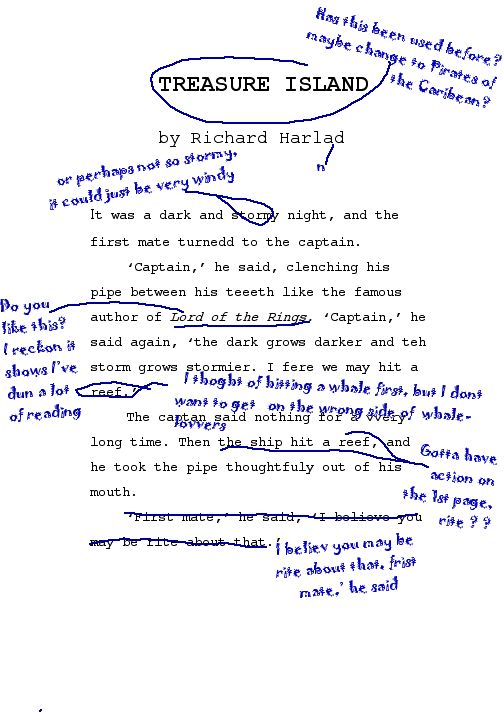2. Submitting
| |
(iv) FORMAT & PRESENTATION |
When most MSS are going to be rejected and a publisher has so many many MSS to consider, the last thing you want to do is supply easy excuses for rejection. It’s an insult to ask a publisher to spend time reading your chapters if you can’t be bothered to spend time eliminating typos, spelling mistakes and sloppy bits of grammar.
Okay, you might have the greatest imagination and tell the greatest story in the world, but if your opening pages are dotted with small errors, nobody’s ever going to discover your true genius. Such errors are superficial and readily fixed—but you’ve given a publisher reason to lose confidence in you. With a hundred other MSS waiting to be read, a tiny loss of confidence is enough to get your MS tossed aside after the first page or two.
When you format your pages, the aim is ease of reading. Double space, generous margins, single side of the sheet. Use a standard serif font such as Times, Times New Roman, New York or Palatino—and never less than 12 point.
I justify left and right, though justified left and ragged right is equally acceptable. A new paragraph should be indented without dropping a line, as in a printed book.
I used to find and print an attractive colour image to go at the front of my submitted MS. I have no idea if it worked, but I reckon a small point-of-difference can’t hurt. The aim is to attract attention without being showy or appearing unprofessional.
The content of your opening pages also needs to attract attention. A dramatic opening that catches a reader’s interest will catch a publisher’s interest too. Not necessarily violent action, though; a publisher will be looking for a fluent style, a smooth unfolding, perhaps a distinctive voice. It’s not true that publishers judge a book on the first half-page—but it helps for an unpublished author to think that way.
If your MS comes back rejected, don’t keep sending out the same copy. A MS that’s no longer in mint condition sends a message that it’s already been read and rejected. That’s a message you really want to keep to yourself.
Side-note. Some people worry that their ideas, if not their actual words, might get stolen and end up in someone else’s book. I’m not saying that never happens, but when it’s so difficult to have a MS accepted in any case, it’s not worth being paranoid about. If your MS comes back rejected, it’s a 99.99% probability that the publisher or agent or reader just wasn’t overwhelmed by your ideas.
What not to submit-->

|





